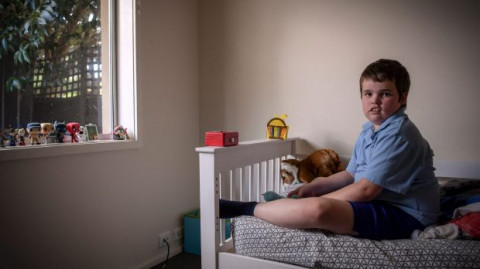
Sometimes when Angus arrived at school, his classroom was empty.
All the students were on an excursion, except for him.
"They kept the excursions a secret," the 12-year-old says. "I wasn't even told about them. It made me sad, and sometimes I got mad."
Angus, who is autistic and has attention deficit hyperactivity disorder, is among around one in three students with a disability who say they have been excluded from events or activities at school, including excursions and camps.
Kate and her son Angus, who is autistic and has ADHD. Photo: Eddie Jim
He stopped receiving excursion notices at one of his former schools in grade 4.
Angus' previous schools thought it would be easier if he wasn't invited. That way he wouldn't know about the trip to the RSPCA to see rescued cats and dogs or the visits to the Melbourne Aquarium and Healesville Sanctuary.
Students are often told it's because they are too disruptive. The school does not want to be held accountable for their behaviour outside the school gates.
This was the case for Angus, who had a meltdown while on an excursion to a high school.
He says he became "overwhelmed" when he was asked to put on his shoes.
"They were too tight," he explains.
His solution was to walk away from everyone, including his aide, and down the street. That was the last time he was invited on an excursion at a mainstream school.
Angus' mother Kate says her son's self-esteem plummeted after he was excluded from camps and excursions.
"They don't understand the impact it has on these kids," she says. "His self-esteem is so low. He doesn't value himself."
Queensland University of Technology academic Linda Graham says it's common for children with a disability to be excluded from excursions.
While she understands schools might be fearful about taking some students on excursions, she says there's always a solution.
This might involve asking parents to attend, or ensuring there is an aide or additional teachers.
"There are a myriad of ways schools can deal with this but it seems to me that they consider the challenge and the extra workload too hard."
The exclusion sends a damaging message, she says.
"The child comes to believe that there is something bad about them. Not just something different, but something bad. They see themselves as broken. It is a very lonely experience … it sends a message that their learning doesn't matter," she said.
Education consultant Professor Loretta Giorcelli says during peak school camp season, she fields three to four calls a week from schools asking if they can prevent a student with disabilities from going on camp.
"It is a legal requirement that students are included on camps," she says.
It was common for schools to ask if they could insist that students with ADHD took medication as a condition of their attendance at camp.
"They ask, can we insist that he not go or participate, if he's not on medication," she says.
Students with special needs have been shut out from camps "since time immemorial", says Professor Giorcelli.
Schools have an obligation to ensure every child participates in activities, according to an Andrews government spokesman. He says they must identify reasonable adjustments and the $148 million camps, sports and excursions fund ensured that no student missed out out.
"The Labor government will continue to give the support needed by students with a disability to ensure they have every chance in life and get the very best education."
Children and Young People with Disability Australia chief executive Stephanie Gotlib says this exclusion doesn't occur in isolation, and many students with a disability have also been shut out of other school activities like sport, NAPLAN tests, school musicals and graduation events.
"This is a remnant of old institutional views, where people with a disability were hidden and excluded," she says.
The organisation's most recent annual survey of more than 1300 families found that 34 per cent said their children with a disability were excluded from events or activities at school, including camps and excursions.
Schools must ensure all students can access excursions and camps, regardless of whether they have funding for a disability aid, according to Ms Gotlib.
"Sometimes it is choosing accessible venues, or having an accessible bus, or workshopping solutions with parents," she says.
Another Melbourne mother, who did not want to be named, says her son had only attended one excursion during primary school and that was because she volunteered to attend.
His school said he could only attend the excursions if they took place during the two hours that his aide was funded.
"These children have a fundamental birthright to their education and part of that involves attending excursions," she says.
She said her son was particularly devastated when he was barred from attending swimming lessons at the local pool. "He thrives in water," she said. "It is his safe space."